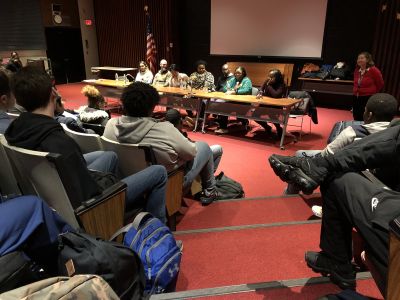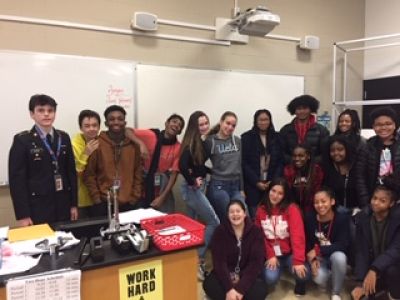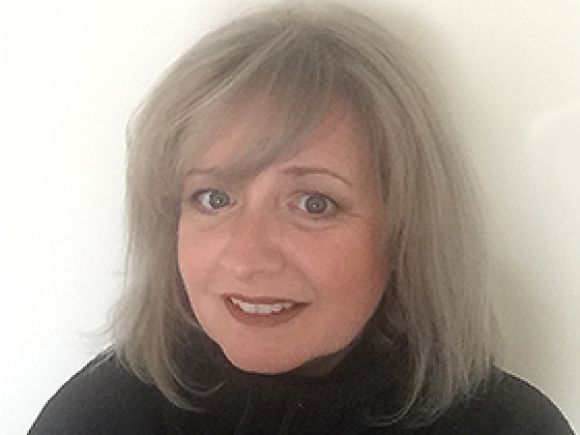Right before the end-of-the-year holiday break, Ann-Marie Butler welcomed some visitors into her biotech classroom at Brockton High School who would dramatically broaden her students’ perspectives of science in the real world. The visitors were staff from different divisions of Amgen who volunteered to share their career pathways, and it was eye-opening for the Massachusetts-area students in a number of ways.
“We liked to have the volunteers here because so many of our kids think either that going into science is far too difficult, or that they’ll just go into college, pick a career, and do that the rest of their life—that it all falls magically in place,” Butler says. “We try to expose them to the fact that there are challenges, and you may go out and find other paths you’re interested in and it’s OK to follow those.”
It was also a eureka moment for her students in other ways, both realizing that a person can have a career in science without working in a lab and that there are people from diverse backgrounds who are successful in the biotech industry.
Butler herself has come full circle in her science path—starting as a student at Brockton High School, getting an informal education on the job, then going to school at night, working in biotech, and pursuing a career in teaching 18 years later. “I have lived a charmed existence, and it’s because of biotech,” she says.
Butler is now in her third year teaching biotech, including the Amgen Biotech Experience (ABE). We spoke with her about the recent Amgen school visit, her amazing path, and her experiences with ABE.
Why was the recent Amgen staff visit to your classroom so important to your students?
We have a lot of immigrant kids and students who grew up in poverty and with racism—it’s so important for them to see people with those same struggles become successful and find their way.
It’s also important for them to see different paths in science. So many of them said “I thought if I worked in biotech it meant I had to work in a lab. ... I didn’t know I could be an engineer. … I didn’t know I could work in a lab without math. … I never knew a biotech company would need people in marketing or lawyers.” Their view of the world was limited in scope.

Was there one moment of the visit that stood out to you as particularly impactful?
Yes, one woman from Amgen explained how growing up in a primarily white suburb of New York City, she always felt she had to carry this label of representing her entire race and culture because she was the only black person. A lot of my students nodded and said they felt that way, too. She explained the importance of not letting people put labels on you. That was fabulous.
There’s a lot of diversity here at Brockton High, as I mentioned earlier. We have students from 33 different countries around the world. But they go out into the rest of the world, and they are the minority, and they do feel those labels upon them.
You have had a fascinating career path yourself. Can you tell us about your journey to biotech?
I graduated from Brockton High School. Growing up in an urban city, like a lot of my peers, I had no real advantages. I didn’t get to go to college right after high school because of my family circumstances. Gradually, when I went out into the world, I pulled together enough experience to work in a “real company.” I started off in a diagnostics company doing customer service, taking orders on immunoassays. I was curious about the assays and how they worked, so I started learning things on my own. I became friends with some of the corporate trainers and technical support staff, and they would teach me things.
What came next for you?
I got my first job in a lab, and I started going to school for biology. I was working full time and went to Northeastern University part time at night. Very slowly, I built this career in biotech. What was really terrific and what I loved about the people is that we were a team and there was a mentoring spirit. They gave me opportunities, taught me a lot, allowed me to observe a lot, and it was a terrific chance to grow my career while getting education. I ran the gamut—laboratory work, quality assurance, marketing, contract management, and project management.
How did you end up in teaching?
I got to this stage where I wanted a change and I never forgot all the people who taught me on the way. I felt like the kids back home in Brockton could benefit from someone out in the real world telling them what it was like. I wanted to use my industry experience to inspire and teach them here from the ground up. So, I left biotech to pursue teaching. It worked out beautifully for me.
What has it been like teaching biotech, especially ABE?
I started teaching biotech 3 years ago, and I was mentored and pushed along by Dr. David Mangus, a veteran teacher and molecular biologist. I learned about the program from him and attended the training sessions. I feel like every year it gets better and easier. I’m learning tips and tricks to make sure the labs run smoothly and getting better at troubleshooting and teaching the processes.
The kids love doing it. They love doing the hands on labs. They love the idea that they’re working with bacteria. They love the idea that they’re working with DNA and plasmids. And when they get the bacteria to glow in the end and it’s all pink, they think that’s awesome.
What has been the impact of the ABE program so far on your students?
A lot of kids who go through the ABE program become so interested in biotech that they then seek out the MLSC Biotech Apprenticeship Challenge program our school runs in the spring. In that program, they have to work independently and intensively. They make their own gels and solutions to transform bacteria using the luciferase gene, quantify their results, create a really detailed and professional lab notebook for every part of the experiments, and, at the end, do a poster presentation. They become very well grounded in laboratory techniques, and it broadens their understanding. After that, they often pursue internships and may go on to pursue science for college; the initial introduction to biotech was ABE.
Did you ever imagine a science path for yourself in high school?
No, I didn’t aspire to be in science. I thought science was too hard. I kind of liked biology. I loved anatomy and physiology but back then, I thought it was too hard and didn’t think I was smart enough. I keep this in mind every day I teach. I ask myself: How do I make this accessible? How do I make this challenging but not so challenging that my kids will shut down? How do I break this down and make it tangible? How do I make sure I am approachable? I explain to them it’s OK to not know the right answer; it’s OK to say it’s hard; it’s not not OK to say it’s too hard. I try to be nurturing so they are encouraged to stay motivated because I remember that used to be me.

What does biotechnology mean to you?
Biotech is where the hope is—the idea that we can solve our environmental crisis and we can solve food shortages and sustainability. It’s health care, it’s quality of life, it’s the ability to treat diseases. Biotech to me revolves around all of these really really important concepts.
In terms of teaching, I share my biotech story. I have a lot of kids who have very difficult home lives and who will have hardships to overcome. I use my experiences to show them that this is a terrific industry. This industry will mentor you, inspire you. This industry will challenge you. This industry educated me. They then look at that as something that they can do, too.
